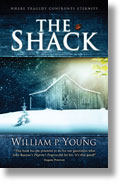
Wm. Paul Young
Reviewed by: John Karas
The Shack, by Wm. Paul Young. Published by Windblown Media, 2007. Paperback, 248 pages, list price $14.99. Reviewed by John Karas, a member of First OPC, Portland, Ore.
The spectacularly popular The Shack is a novel about forgiveness and finding comfort through a personal relationship with God. While William P. Young may be commended for exploring these important subjects, he has done so in an unbiblical way. This book is blasphemous, irreverent, heterodox, and just plain silly.
The novel’s main character is Mack, whose youngest daughter has been murdered by a serial killer in an old shack in rural Oregon, leaving Mack angry at God. But one day he receives a mysterious note from “Papa” (his wife’s name for God) inviting him to the shack for a weekend.
Out of curiosity, Mack drives to the shack. There he meets God the Father as a large African-American woman; the Son, as a Middle-Eastern laborer; and the Holy Spirit, as a small Asian woman. Through this encounter, Mack confronts his personal demons and learns lessons about God, himself, life, and forgiveness. But he and the reader learn aberrant theology.
This reviewer found the following doctrinal problems with The Shack.
• It presents the persons of the Godhead idolatrously—in a manner contrary to their self-revelation in Scripture.
• It irreverently reduces the mystery of the communion among the persons of the Trinity to silliness (pp. 88, 89, 105).
• It blasphemously portrays God the Father as a woman shaking her hips while listening to funky music on earphones (p. 90).
• It denies that the Father’s ontological Fatherhood is the basis for his revealing himself as Father, and suggests that he did so for purely practical reasons (p. 94).
• It teaches that all three persons of the Trinity became incarnate and accepted limitations to their divine nature (p. 99).
• It denies the sovereignty of God over the events of history (pp. 185, 222).
• It teaches that God chooses to limit his divine knowledge to facilitate his relationships with people (p. 106).
• It denies election (p. 162).
• It blurs the distinction between God’s general love for all mankind and his special love for his elect (p. 162).
• It teaches that all of God’s actions are predicated upon love (p. 102).
• It teaches that God does not punish people for their sins (p. 120).
• It raises doubts about the reality of hell (pp. 162, 163).
• It denies that the Father temporarily forsook Christ on the cross (p. 96).
• It teaches that Jesus performed miracles simply by living out his relationship with God to the utmost (pp. 99, 100).
• It denies that Jesus’ life was intended as an example for Christians to follow (p. 149).
• It teaches that Jesus has accomplished a universal reconciliation that includes universal forgiveness (pp. 192, 225).
• It depreciates the Bible (pp. 65, 66).
• It denigrates the institutional church (pp. 178, 179).
• It creates a false distinction between “being a Christian” and having a relationship with Christ, and possibly suggests that one can continue to be a follower of a false religious system and still have a relationship with Christ (p. 182).
• It creates a false distinction between obedience and relationship, teaching antinomianism (pp. 197, 198, 203).
For these and other reasons, The Shack is a dangerous book and ought to be avoided by Christians.
March 30, 2025
On the Trail with a Missionary
March 23, 2025
Midnight Mercies: Walking with God Through Depression in Motherhood
March 16, 2025
March 09, 2025
Zwingli the Pastor: A Life in Conflict
March 02, 2025
February 23, 2025
African Heroes: Discovering Our Christian Heritage
February 16, 2025
© 2025 The Orthodox Presbyterian Church